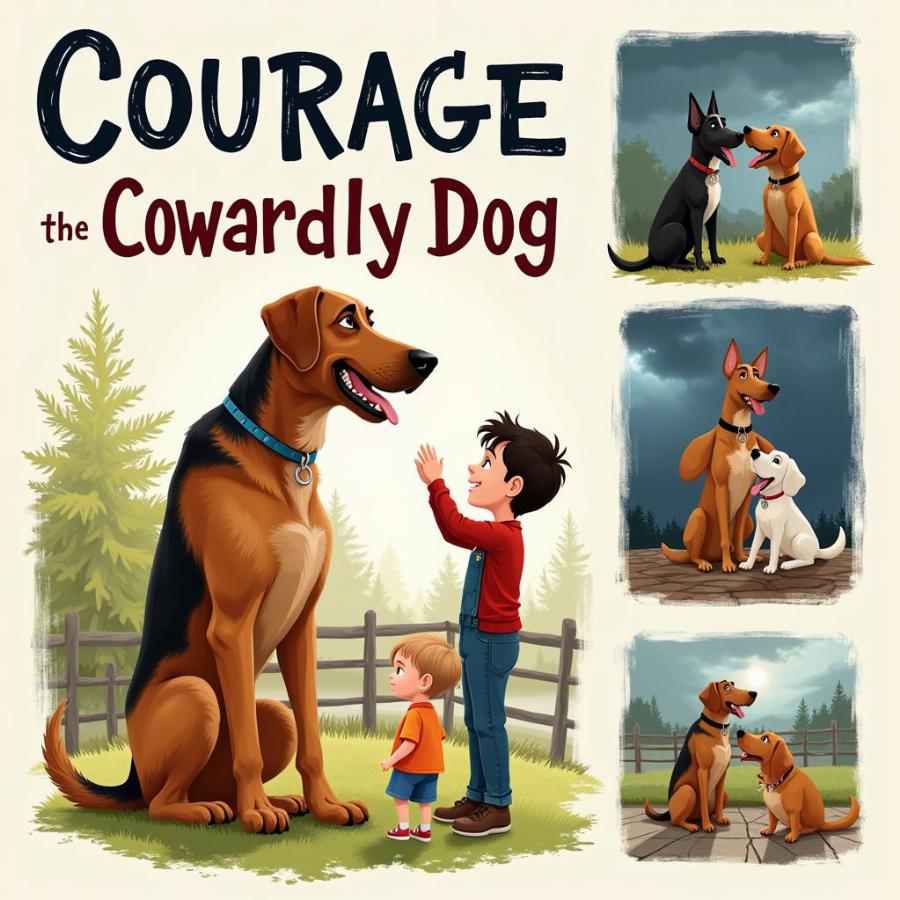Courage the Cowardly Dog, the beloved cartoon character, embodies a paradox: a dog perpetually terrified yet consistently rising to protect his owners from the bizarre and often supernatural dangers lurking in the seemingly mundane town of Nowhere. While Courage’s cartoonish fears provide endless comedic fodder, they also tap into a deeper truth about dogs: their incredible capacity for love and loyalty, which can manifest as surprising bravery. While real dogs might not face off against giant chickens or sentient bananas, their everyday courage is often just as remarkable.
While Courage might encounter aliens and talking slabs of meat, many real-life dog breeds also showcase courage, albeit in less fantastical ways. Guard dogs like German Shepherds and Rottweilers are known for their protective instincts, while smaller breeds like Chihuahuas often display a surprising boldness despite their size. But courage isn’t limited to specific breeds. Any dog, regardless of size or pedigree, has the potential for bravery. So, what drives a dog to overcome its fears and act courageously? The answer often lies in the deep bond they share with their human companions.
What Motivates a Dog’s Courage?
Just like Courage’s unwavering devotion to Muriel, the driving force behind canine courage is often love and loyalty. Dogs are social creatures who thrive on companionship, and their connection with their humans can inspire them to overcome their natural instincts. Whether it’s protecting their family from a perceived threat or simply offering comfort during a thunderstorm, a dog’s love can push them to do extraordinary things.
Is it Nature or Nurture?
The age-old debate of nature versus nurture applies to canine courage as well. While certain breeds may have a genetic predisposition towards protective behavior, early socialization and training play a crucial role in shaping a dog’s temperament and response to fear. A well-socialized dog is more likely to be confident and resilient, making them less prone to fear-based aggression or excessive timidity. Proper training can also empower dogs to manage their fear and react appropriately in challenging situations.
 Courage Dog and Real-Life Bravery Examples
Courage Dog and Real-Life Bravery Examples
How to Encourage Courage in Your Dog
Building your dog’s confidence is key to fostering courage. Positive reinforcement training, using rewards and praise, can help your dog overcome their fears and develop a sense of self-assurance. Exposing your dog to new experiences and environments in a controlled and positive manner can also build resilience and reduce anxiety.
Confidence-Building Activities
- Socialization: Introduce your dog to other dogs and people of all ages in safe and supervised settings.
- Environmental Enrichment: Provide a stimulating environment with toys, puzzles, and opportunities for exploration.
- Positive Reinforcement Training: Focus on rewarding desired behaviors and building a positive association with new experiences.
- Desensitization and Counterconditioning: Gradually expose your dog to their fears in a controlled environment while pairing the experience with positive reinforcement.
Courage Doesn’t Mean Fearlessness
It’s important to remember that courage isn’t the absence of fear. Even the bravest dogs experience fear. True courage is about overcoming that fear to protect or comfort those they love. Just like Courage the Cowardly Dog, our real-life canine companions often demonstrate a remarkable ability to face their fears head-on, driven by the powerful bond they share with us. Their everyday acts of bravery, whether big or small, remind us of the incredible power of love and loyalty.
FAQ
- Can any dog be courageous? Yes, any dog, regardless of breed or size, has the potential for courage.
- How can I tell if my dog is being courageous? Look for signs of your dog overcoming their fear to protect or comfort someone.
- What should I do if my dog is overly fearful? Consult with a professional dog trainer or behaviorist for guidance on addressing your dog’s anxiety.
- Is it okay for my dog to be scared sometimes? Absolutely! Fear is a natural emotion. Courage is about managing fear, not eliminating it.
- How can I help my dog build confidence? Positive reinforcement training, socialization, and environmental enrichment can all help boost your dog’s confidence.
Further Reading on Beaut Dogs
Check out these other articles for more information on dog behavior and care:
Beaut Dogs: Your Source for All Things Canine
Beaut Dogs is your one-stop shop for reliable and comprehensive information on the wonderful world of dogs. From breed-specific details to expert advice on care and training, we’re here to help you provide the best possible life for your canine companion. When you need support, contact Email: [email protected] to get detailed and accurate answers from Beaut Dogs.